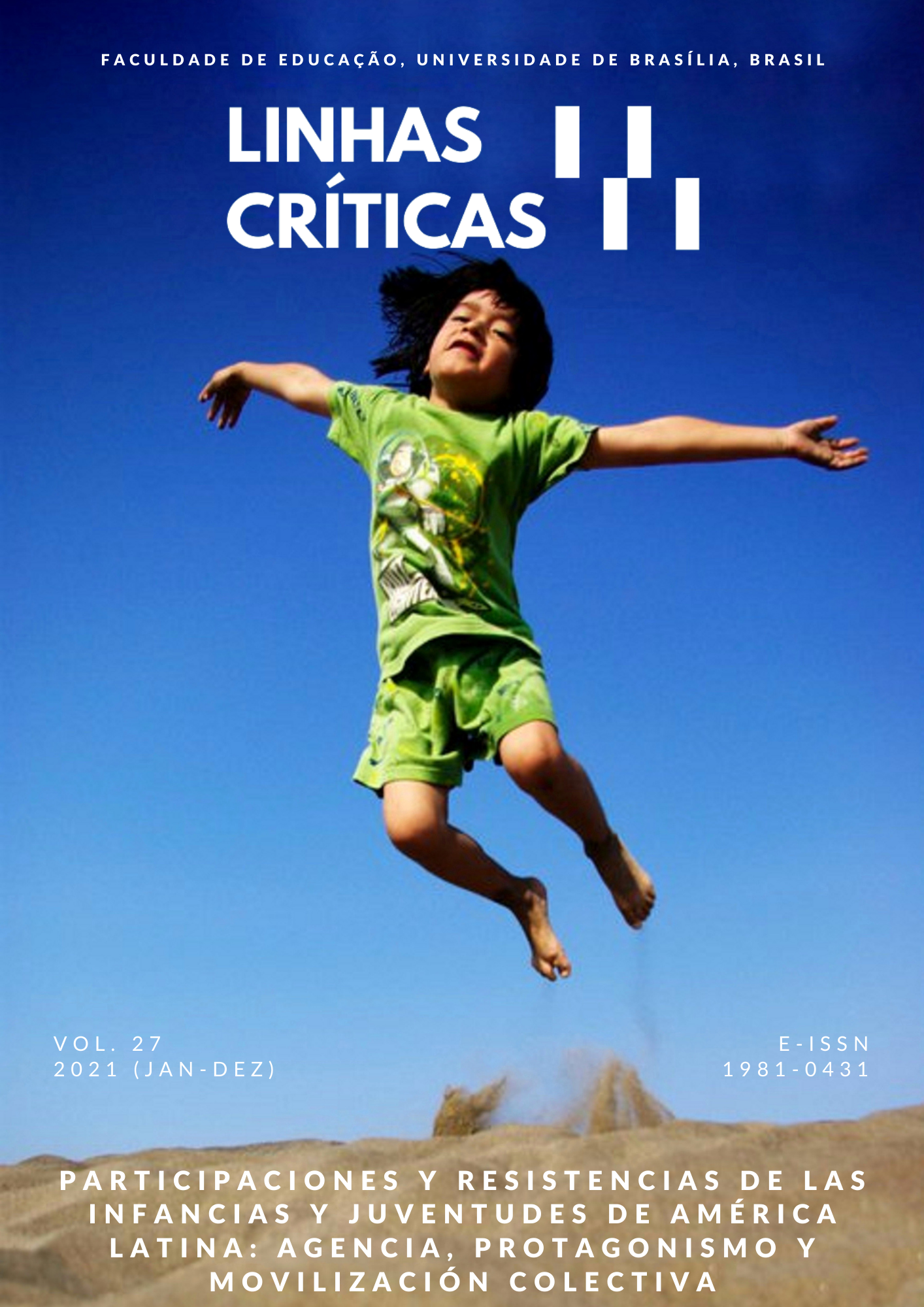Epistemology, emancipation and education in adornian and decolonial perspective
possible intersections
DOI:
https://doi.org/10.26512/lc27202137539Keywords:
Critical theory, Decoloniality, Epistemology, Emancipation, EducationAbstract
This article touches on the convergences and divergences between some of the ideas by the critical theorist Theodor Adorno and by decolonial thinkers. It also intends to examine how this encounter houses the concept of emancipatory education. Along the text, an overview of the central concepts by Adorno will be put into dialog with ones by decolonial thinkers, focusing on ideas of epistemology, emancipation and education. With this, we expect to understand in what Adorno corroborates decoloniality, in what the latter helps to reexamine in the works of the German philosopher and, ultimately, catch a glimpse at the project of an emancipatory education with elements from both sources.
Downloads
References
Adorno, T. W. (1986). Capitalismo tardio ou sociedade industrial. Em G. Cohn. Theodor W. Adorno (pp. 62-75). Ática.
Adorno, T. W. (1995a). Educação e Emancipação. Paz e Terra.
Adorno, T. W. (1995b). Palavras e Sinais: modelos críticos 2. Vozes.
Adorno, T. W., & Horkheimer, M. (1985). O conceito de esclarecimento. Em T. W. Adorno & M. Horkheimer. Dialética do esclarecimento: fragmentos filosóficos (pp. 19-52). Jorge Zahar.
Allen, A. (2016). The end of progress: decolonizing the normative foundations of critical theory. Columbia University Press.
Ballestrin, L. (2017). Modernidade/Colonialidade sem “Imperialidade”? O Elo Perdido do Giro Decolonial. DADOS – Revista de Ciências Sociais, 60(2), 505-540. https://doi.org/10.1590/001152582017127
Borba, P., & Benzaquen, G. (2020). Teoria Crítica nas Margens: um diálogo entre marxismo e pós-colonialismo. Revista Brasileira de Ciências Sociais, 35(103), 1-17. https://doi.org/10.1590/3510312/2020
Grosfoguel, R. (2008). Para descolonizar os estudos de economia política e os estudos pós-coloniais: transmodernidade, pensamento de fronteira e colonialidade global. Revista crítica de ciências sociais, 80, 115-147. https://doi.org/10.4000/rccs.697
Jardim, G. R. (2017). Dialética negativa e o pensamento decolonial. Revista SURES, 10, 1-14. https://revistas.unila.edu.br/sures/article/view/608
Kumaravadivelu, B. (2016). The decolonial option in English teaching: can the subaltern act? TESOL quarterly, 50(1), 66-85. https://doi.org/10.1002/tesq.202
Maia, J. M. E. (2013). Além da pós-colonialidade: a sociologia periférica e a crítica ao eurocentrismo. Cadernos de estudos culturais, 5, 93-64. Disponível em: https://periodicos.ufms.br/index.php/cadec/article/view/3509/2780.
Marcuse, H. (1979). O fechamento do universo da locução. Em H. Marcuse. Ideologia da sociedade industrial: o homem unidimensional (pp. 92-121). Jorge Zahar.
Martins, P. H. (2019). Teoria crítica da colonialidade. Ateliê de Humanidades.
Mignolo, W, D. (2017). Colonialidade: o lado mais escuro da modernidade. Revista Brasileira de Ciências Sociais, 32(94), 1-18. https://doi.org/10.17666/329402/2017
Mignolo, W. D., & Walsh, C. E. (2018). On decoloniality: concepts, analytics, praxis. Duke University Press.
Pucci, B. (2001). Teoria Crítica e Educação: contribuições da teoria crítica para a formação do professor. Espaço Pedagógico, 8, 13-30. http://www.unimep.br/~bpucci/teoria-critica-e-educacao.pdf
Quijano, A. (1989). Identidad y utopía en América latina. El Conejo.
Quijano, A. (2005). Colonialidade do poder, eurocentrismo e América Latina. Em E. Lander. A colonialidade do saber: eurocentrismo e ciências sociais. Perspectivas latino-americanas (pp. 107-130). CLACSO.
Ribeiro, D., & Gaia, R. da S. P. (2021). Uma perspectiva decolonial sobre formação de professores e educação das relações étnico-raciais. Linhas Críticas, 27, 1-16. https://periodicos.unb.br/index.php/linhascriticas/article/view/35968/29218
Santos, B. de S. (2007). Renovar a teoria crítica e reinventar a emancipação social. Boitempo.
Walsh, C. E. (2009). Interculturalidade crítica e pedagogia decolonial: in-surgir, re-existir e re-viver. Em V. M. Candau. Educação intercultural na América Latina: entre concepções, tensões e propostas (pp. 12-43). 7 Letras.
Zanolla, S. R. (2010). Educação e barbárie: aspectos culturais da violência na perspectiva da teoria crítica da sociedade. Sociedade e Cultura, 13(1), 117-123. https://doi.org/10.5216/sec.v13i1.11182
Published
How to Cite
Issue
Section
License
Copyright (c) 2021 Victor Hugo Oliveira Magalhães

This work is licensed under a Creative Commons Attribution 4.0 International License.
Authors who publish in this journal agree to the following terms:
-Authors maintains the copyright and grants the journal the right of first publication, the work being simultaneously licensed under the Creative Commons Attribution License which allows the sharing of the work with recognition of the authorship of the work and initial publication in this journal.
- Authors are authorized to enter into additional contracts separately, for non-exclusive distribution of the version of the work published in this journal (eg publish in institutional repository or as a book chapter), with acknowledgment of authorship and initial publication in this journal.
-Authorers are allowed and encouraged to publish and distribute their work online (eg in institutional repositories or on their personal page) at any point before or during the editorial process, as this can generate productive changes as well as increase the impact and the citation of published work (See The Effect of Free Access).



